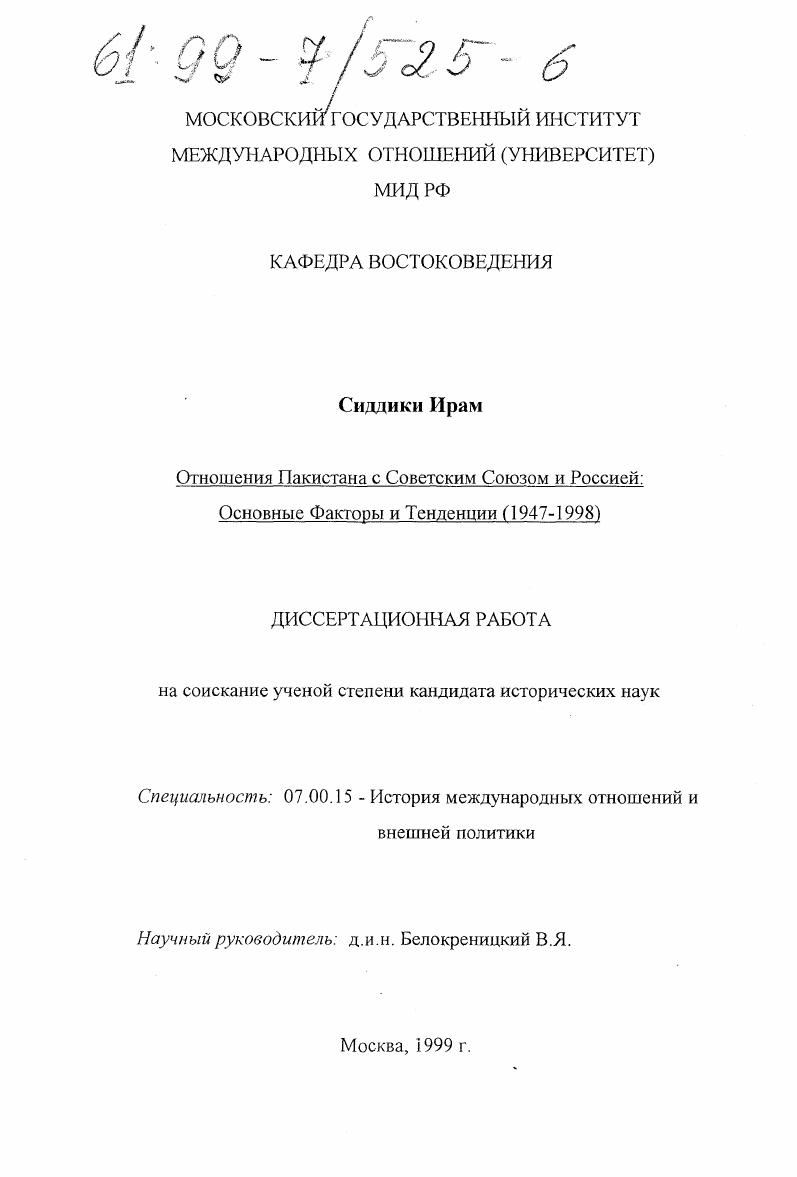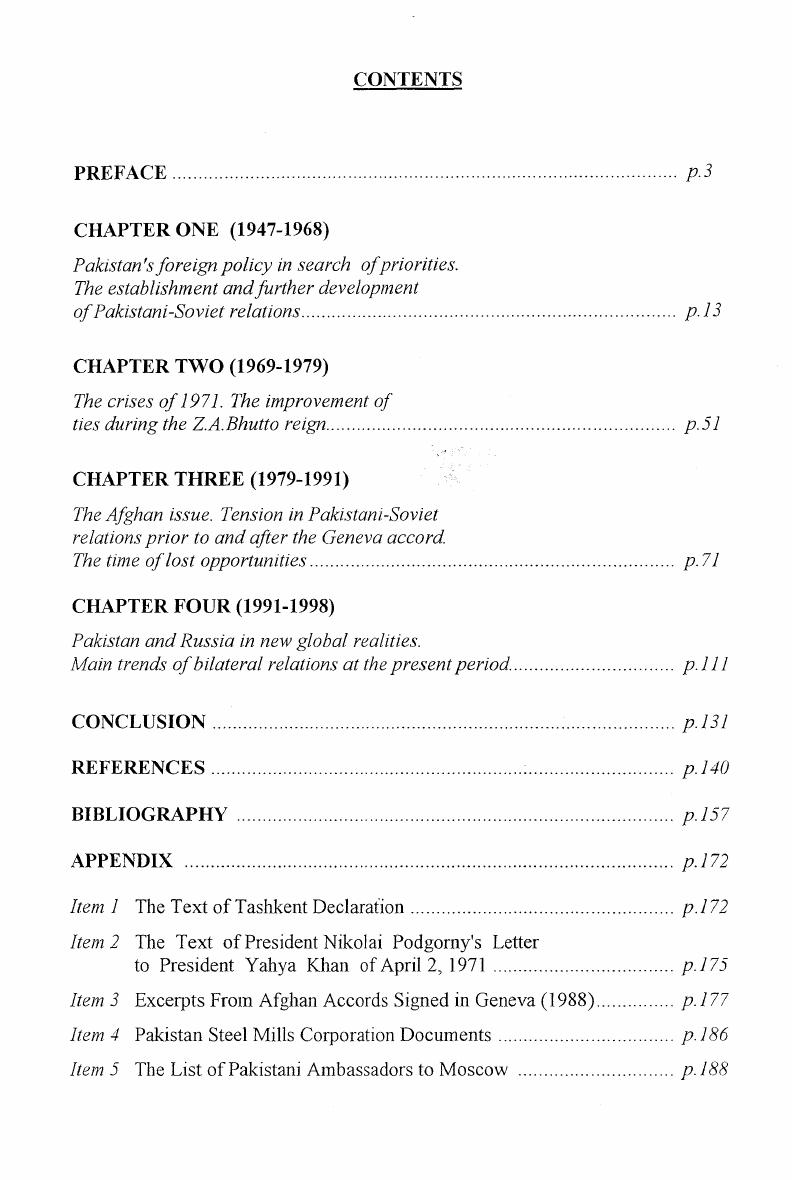Отношения Пакистана с Советским Союзом и Россией : Основные факторы и тенденции, 1947-1998 гг.

- Автор:
Сиддики Ирам
- Шифр специальности:
07.00.15
- Научная степень:
Кандидатская
- Год защиты:
1999
- Место защиты:
Москва
- Количество страниц:
189 с.
Стоимость:
700 р.499 руб.


MOSCOW STATE INSTITUTE OF INTERNATIONAL RELATIONS (UNIVERSITY) OF THE RUSSIAN MINISTRY OF FOREIGN AFFAIRS
DEPARTMENT OF ORIENTAL STUDIES
Siddiqui Erum
Pakistan's Relations With The Soviet Union And Russia: Major Factors And Trends 11947-1998)
DISSERTATION For Ph.D Degree
Discipline: 07.00.15 - History of International Relations and
Foreign Policy
Research Advisor: Ph.D V.Ya.Belokrenitsky
Moscow, 1999
CONTENTS
PREFACE
CHAPTER ONE (1947-1968)
Pakistan 's foreign policy in search of priorities.
The establishment and further development
of Pakistani-Soviet relations
CHAPTER TWO (1969-1979)
The crises of 1971. The improvement of
ties during the Z.A.Bhutto reign
CHAPTER THREE (1979-1991)
The Afghan issue. Tension in Pakistani-Soviet relations prior to and after the Geneva accord.
The time of lost opportunities
CHAPTER FOUR (1991-1998)
Pakistan and Russia in new global realities.
Main trends of bilateral relations at the present period
CONCLUSION
REFERENCES
BIBLIOGRAPHY
APPENDIX
Item 1 The Text of Tashkent Declaration
Item 2 The Text of President Nikolai Podgorny's Letter
to President Yahya Khan of April 2, 1971
Item 3 Excerpts From Afghan Accords Signed in Geneva (1988)
Item 4 Pakistan Steel Mills Corporation Documents
Item 5 The List of Pakistani Ambassadors to Moscow
PREFACE
The Topicality of the Problem
The interest in studying bilateral relations of Pakistan with the Soviet Union and Russia is defined by the place they have been occupying in the contemporary system of international relations and in the foreign policy of the both countries as well. During more than 50 years they remained their unique character demonstrating simultaneously typical and singular examples of a relationship of the Cold War era and afterwards as well. Naming Soviet-Pak relations as typical means first of all that they were initiated and further built in the framework of bipolar international system and hence were to high grade obedient to its compulsions. Though there was a great pragmatic interest in developing relations by the both sides it was relegated to the shadow of geopolitical and strategic considerations of that time.
The uncommon feature of Pakistani-Soviet relations is that they have been more advanced in the field of trade and economic cooperation while political contacts experienced much lower pace and good will. The ties of Pakistan with Russia may be reckoned odd on the contrary reason - economic cooperation has been definitely left behind the progress in political sphere which got free of the burden of the Cold War imperatives.
The topicality of the research is also added by the aspects dealing with the policy of Pakistan and Russian Federation in the region which lays between them -Afghanistan and Central Asia. As at present Pakistani-Russian relations are at the stage of stagnation the study is designated to analyze the reasons of that predicament as well as the factors driving the whole complex of interaction between the countries and its prospect in the future.
In the context of international politics Pakistani-Russian relations take special meaning in the light of the rapid and overt nuclearization of the Southern Asian region with a sensitive threat to destabilize the situation on the globe. The non-
The Baghdad pact was signed on February 24, 1954 and later (in 1959) was named as the Central Treaty Organization. Iraqis were reluctant to sign any pact with the Turks. In Iraq the view according to a British journal was that "the government had gone beyond public opinion in signing the pact with Turkey".[64] The Turkish and the Iraqis pursued to secure more signatories and special attention was focused on Pakistan. Ayub Khan who was the defense minister spoke out against the pact and stated that "the pact could only be saved if the Americans join in. Our joining in earlier will be pre-mature and will do no good to us or them".[65] The United States did not formally join the pact but participated at the council meeting as an observer. They also helped in setting up a radar warning network for the area. There was reassurance given to Ayub about the further American intentions to the Baghdad pact. In the end Ayub Khan made an admission but classified that Pakistan's obligations would be strictly limited to a direct attack on Turkey or Iraq. However, if Turkey was drawn into a war through her membership of NATO by an attack on Norway, then Pakistan would not be involved. Secondly Pakistan would make no greater commitment which would mean weakening of her own defense potential.
Although it was a well considered military strategy to protect the area from Soviet invasion but, for Pakistan the result was that it proved to be the final straw for Soviet patience. The Soviet Union adopted a new strategy towards Pakistan. The USSR started cultivating both Kabul and New Delhi and so any hope of resolving the Kashmir dispute in the United Nations was over. The Secretary General of the Communist party N.S. Khruschev and the Prime Minister of the Soviet Union N. A.Bulganin visited India in 1955. During their tour they went to Jammu and Kashmir and while at Sirinagar Khruschev went on to say "that Kashmir is one of the states of the republic of India. It is a question that the people themselves has decided".[66] Refusing to consider Kashmir as a disputed territory the Kremlin moved closer to India. Nehru visited the USSR in the summer of the same year and
Рекомендуемые диссертации данного раздела
| Название работы | Автор | Дата защиты |
|---|---|---|
| Луис Фишер и советско-американские отношения первой половины XX века | Швецов, Александр Алексеевич | 2018 |
| Политика США в Корее в 1866-1905 гг. | Шарафетдинова, Алина Исмаиловна | 2014 |